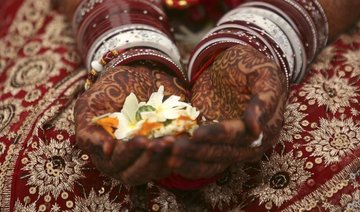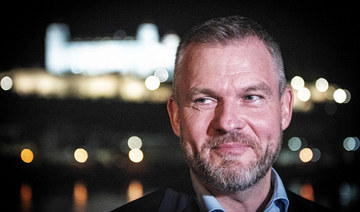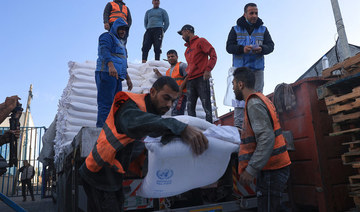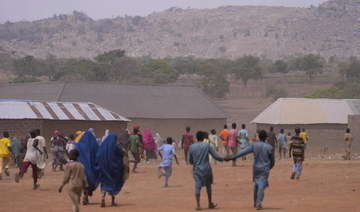JAIPUR, India: Before the three sisters and their children were found dead in a well, they left a message blaming the family they had married into.
Kalu, Kamlesh and Mamta Meena were victims of a dispute over dowries, the often hefty sums Indian parents pay to marry off their daughters.
The sisters had wed brothers from the same household and lived under the same roof, but suffered constant violence from their husbands and in-laws, according to the trio’s grieving relatives.
They were abused constantly, they say, including when their father failed to meet demands for more money.
All three were found dead last month near their marital home, a village on the outskirts of Jaipur, along with Kalu’s four-year-old son and infant child. Both Kamlesh and Mamta were pregnant.
“We don’t wish to die but death is better than their abuse,” read a message on WhatsApp left by one of the sisters after their disappearance, a cousin said.
“Our in-laws are the reason behind our deaths. We are dying together because it’s better than dying every day.”
Authorities are investigating and currently treating the deaths as suicides, a senior police officer in Jaipur said.
The sisters’ distraught father, Sardar Meena, said life had been a living hell for his daughters, whose husbands banned them from pursuing their education and constantly harassed them for more payments.
“We had already given them so many things, you can see them in their home,” he said, counting off the beds, television sets and refrigerator he provided to the family.
“I am the father of six girls, there is a limit to how much I can give,” added Sardar, who earns a meager income as a farmer.
“I had educated them and just doing that was difficult.”
Police have arrested the three husbands, their mother and a sister-in-law on charges of dowry harassment and spousal abuse.
Attempts to contact the men’s family were unsuccessful.
India outlawed the practice of paying dowries more than 60 years ago, and harassment or extortion over the payments is a criminal offense.
But the custom persists, particularly in rural areas, undergirded by social conventions that treat women as an economic burden and demand compensation for accepting them as brides.
Local news outlets regularly report on marital property disputes that end in murder.
Last year, a man in the southern state of Kerala was jailed for life after using venomous snakes to murder his wife and take sole control of their property, which included a new car and 500,000 rupees ($6,500) provided by her family as dowry.
Courts have also been punitive in their treatment of dowry harassment, last month jailing a man in Kerala for 10 years after his payment demands were blamed for driving his wife to suicide.
A pervasive taboo around divorce — only one in 100 Indian marriages end in dissolution — has kept married women from contemplating escape from abusive situations.
For the Meena sisters, leaving was never seen as an option, even though their relatives were aware of the violence.
“Once they were married, we thought they should remain in their marital homes, to maintain the dignity of the family,” Sardar said.
“If we had gotten them remarried in another home, and if that situation turned out to be worse, then what will we do? We’ll lose face.”
India’s National Crime Records Bureau recorded nearly 7,000 dowry-related killings in 2020 — around 19 women every day.
The same agency reported that more than 1,700 women killed themselves that year over “dowry-related issues.”
Both figures are dependent on reports to police, and experts say the actual number of cases is much higher, as with other data on family violence.
“In an hour, some 30 to 40 women are victims of domestic violence... and these are just documented (cases), so it must be much more than that,” Kavita Srivastava, an activist with India’s People’s Union for Civil Liberties, said.
Srivastava said the dowry dispute involving the Meena sisters was just one part of their tormentors’ efforts to control their lives and restrict their independence.
The fundamental cause, she added, was a widespread social acceptance of domestic violence in India that leaves women feeling trapped in oppressive and violent relationships.
“If even one woman has to kill herself because her marital life seems like the end of the road,” she said, “I feel the Indian state has failed for those women.”
Death of three sisters spotlights India dowry violence
https://arab.news/5cpt6
Death of three sisters spotlights India dowry violence

- Sisters had wed brothers from the same household and lived under the same roof
- Trio abused constantly, including when their father failed to meet demands for more money
Greece rescues 42 migrants off Crete, searches for three missing

It was not clear what happened to their boat
ATHENS: Greece rescued 42 migrants off the island of Crete and was looking for three believed to be missing after their boat sent a distress signal while at sea, the Greek coast guard said on Thursday.
A coast guard official said the migrants were rescued by commercial vessels and a Greek navy helicopter some 27 nautical miles southwest of Crete.
It was not clear what happened to their boat, the official told Reuters on condition of anonymity, adding that a search and rescue operation for the missing was under way.
The island of Crete and its tiny neighbor Gavdos, Europe’s southernmost tip, have seen a surge in arrivals of migrants looking to cross to Europe from Libya in recent months.
The Greek government has pledged money and staff to help the ill-equipped islands handle the situation.
Greece has been a favored gateway to the European Union for migrants and refugees from the Middle East, Africa and Asia since 2015 when nearly 1 million people landed on its islands, causing an unprecedented humanitarian crisis. Thousands of others have died at sea.
Until recently, migrants had preferred islands further east near Turkiye over Crete and Gavdos.
Slovakia PM Fico’s fate remains in balance after surgery, deputy PM says

- The shooting was the first major assassination attempt on a European political leader for more than 20 years
- "Unfortunately, I cannot say yet that we are winning (the battle to save Fico) or that the prognosis is positive," Deputy Prime Minister Robert Kalinak said
BRATISLAVA: Slovakia’s Prime Minister Robert Fico remains in a serious condition and it is too soon to say whether he will recover, a deputy prime minister said on Thursday, a day after an assassination attempt that has sent shock waves across Europe.
The shooting was the first major assassination attempt on a European political leader for more than 20 years, and has drawn international condemnation. Political analysts and lawmakers say it has exposed an increasingly febrile and polarized political climate both in Slovakia and across Europe.
“Unfortunately, I cannot say yet that we are winning (the battle to save Fico) or that the prognosis is positive because the extent of the injuries caused by four gunshot wounds is so extensive that the body’s response will still be very difficult,” Deputy Prime Minister Robert Kalinak said.
Interior Minister Matus Sutaj Estok, speaking at the same news conference, said the shooter — whom police have charged with attempted murder — had acted alone and had previously taken part in anti-government protests.
“This is a lone wolf who had radicalized himself in the latest period after the presidential election (in April),” Sutaj Estok said.
The suspect listed government policies on Ukraine and its plans to reform the country’s public broadcaster and dismantle the special prosecutor’s office as reasons for the attack, the interior minister added.
Miriam Lapunikova, director of the F.D. Roosevelt University Hospital in Banska Bystrica where Fico is being treated, said the 59-year-old prime minister had undergone five hours of surgery with two teams to treat multiple gunshot wounds.
“At this point his condition is stabilized but is truly very serious, he will be in the intensive care unit,” she told reporters.
Slovak President Zuzana Caputova called for a calming of political tensions. Fico ally and President-elect Peter Pellegrini urged parties to suspend or tone down their campaigning for next month’s European Parliament elections.
“If there is anything the people of Slovakia urgently need today, it is at least a basic consensus and unity among Slovaks’ political representatives,” said Pellegrini, who won an April election for the mainly ceremonial post of president.
VETERAN LEADER
Fico has dominated Slovak politics for much of the past two decades, winning re-election last October for a fourth stint as premier.
He has fused left-leaning economic views with nationalism, tapping into widespread discontent over living standards, but has also proved a divisive figure. His critics say new reforms threaten the rule of law and media freedoms in Slovakia, a member state of the European Union and NATO.
Fico’s calls for ending sanctions on Russia and halting arms supplies to Ukraine have endeared him to Moscow, and President Vladimir Putin and other Russian politicians have been prominent among those condemning Wednesday’s assassination attempt.
Fico was shot while greeting supporters in the street after chairing a government meeting in the central town of Handlova.
Slovak news media reported that the 71-year-old gunman was a former security guard at a shopping mall, the author of three collections of poetry and a member of the Slovak Society of Writers. News outlet Aktuality.sk cited the suspect’s son as saying his father was the legal holder of a gun license.
There has been no official confirmation of the gunman’s identity and background.
The incident raised questions over Fico’s security arrangements, as the attacker managed to fire five shots at point blank range despite the prime minister being accompanied by several bodyguards.
In an undated video posted on Facebook, the alleged attacker was seen saying: “I do not agree with government policy” and criticizing government plans to revamp the public broadcaster.
Reuters verified the person in the video matched images of the man arrested after Fico’s shooting.
Fico and his government coalition allies have criticized sections of the media and the opposition, saying they had inflamed tensions in the central European state.
Slovakia’s biggest opposition party, the liberal, pro-Western Progressive Slovakia, was quick to condemn the shooting and called off a protest rally planned for Wednesday evening. It has also urged all politicians to avoid stoking tensions.
Russian tycoon Deripaska calls latest US sanctions ‘balderdash’

- “I strongly believe that we need to do everything we can to establish peace, not serve the interests of warmongers,” Deripaska said
- Since Russia’s invasion of Ukraine, Deripaska has been sanctioned by Britain for his alleged ties to Putin
FRANKFURT: Russian tycoon Oleg Deripaska dismissed the latest US sanctions on a series of companies that the US Treasury said were connected to a scheme to evade sanctions and unlock frozen shares as nonsense.
“This balderdash isn’t worth the time,” Deripaska said by message via a spokesperson in response a Reuters request for comment about the latest US sanctions.
“While the horrific war in Europe claims hundreds of thousands of lives every year, politicians continue to engage in their dirty games. I strongly believe that we need to do everything we can to establish peace, not serve the interests of warmongers,” he said.
The US Treasury on Tuesday announced it had sanctioned a web of Russian companies it said were being used to disguise ownership of a $1.6 billion industrial stake controlled by Deripaska.
Austria’s Raiffeisen Bank International was planning to buy the stake and dropped the transaction following mounting US pressure to abort the bid.
In its sanctions announcement, the US Treasury alleged it was an “attempted sanctions evasion scheme” to unfreeze a stake using “an opaque and complex supposed divestment.”
Since Russia’s invasion of Ukraine, Deripaska has been sanctioned by Britain for his alleged ties to Putin. He has mounted a legal challenge against the sanctions which he says are based on false information and ride roughshod over the basic principles of law and justice.
Deripaska, who made his fortune by buying up stakes in aluminum factories has also been subjected to sanctions by the United States, which in 2018 took measures against him and other influential Russians.
Those sanctions were “groundless, ridiculous and absurd,” Deripaska has previously said.
Outrage grows in India after Israel kills Indian army veteran

- Col. Waibhav Anil Kale was working for the UN Department of Safety and Security
- More than 190 UN staff killed since the beginning of Israel’s onslaught on Gaza
NEW DELHI: The killing of an Indian army veteran serving as a UN staffer in Gaza has stirred outrage in India and prompted calls for the government to hold Israel accountable.
Col. Waibhav Anil Kale was on duty with the UN Department of Safety and Security when his UN-marked vehicle was targeted in southern Gaza on Monday.
A former peacekeeper, he was hit on the way to the European Hospital in Rafah by what the UN said it had no doubt was Israeli tank fire.
The Indian Ministry of External Affairs issued a statement on Wednesday in response, saying it was “deeply saddened by the death” and that it was “in touch with relevant authorities” regarding an investigation into the incident.
The statement did not contain condemnation, unlike in July 2022, when two Indian peacekeepers were killed in an attack on a UN Organization Stabilization Mission base in the Democratic Republic of the Congo.
At that time, India’s foreign minister said the perpetrators “must be held accountable and brought to justice” and convened a special meeting of the UN Security Council to discuss the attack.
Talmiz Ahmad, former Indian ambassador to Saudi Arabia, told Arab News on Thursday that the government’s response was “grossly inadequate” given it was a “calculated killing” of an Indian army officer and UN staffer.
“The Indian government can hold Israel accountable. India is a sponsor of a resolution related to the protection of the UN personnel,” he said.
“This particular killing of a UN officer is a targeted killing because it was very obvious to Israelis that this was a UN vehicle, and it was on an official UN mission. A tank deliberately targeted this vehicle.”
New Delhi has always been sensitive to assaults on UN personnel given that it is one of the largest contributors of the organization’s peacekeepers.
The reaction to Kale’s killing was insufficient, according to Kavita Krishnan, a women’s rights activist.
“If a person is a UN employee, he is entitled to protection,” she said.
“The Indian government should specifically hold Israel accountable for this killing. They cannot treat it just as a casualty of war or collateral damage.”
Israel’s deadly siege and bombardment of Gaza has since October killed over 35,000 people, wounded 70,000, and left most of the enclave’s population starving and with no access to medical, food and water supplies.
The UN estimates that more than 190 of its staff members have also been killed in the ongoing onslaught. Kale was the first international UN employee to be killed.
“It’s condemnable that India does not name the fact of assassination. It’s not death. He did not die of illness. He was killed by Israel,” said Apoorvanand Jha, a public intellectual and professor at the University of Delhi.
“Israel kills people who are involved in the health services … kills journalists, aid workers and kills workers involved in the peacekeeping forces. So, it does it knowingly. It is not a collateral damage. Israel does it knowingly — this is what has been recorded many times. Israel needs to be held accountable for all the individual crimes of assassinations and the collective crimes, mass deaths.”
The killing of UN personnel goes against international humanitarian law.
“New Delhi should tell Tel Aviv that it should respect international law,” said Anwar Sadat, senior assistant professor at the Indian Society of International Law.
“The Indian government should issue a diplomatic demarche to the Israeli government.”
The government’s reaction was also seen as not boding well for the safety of Indian workers whom New Delhi has agreed to send to Israel.
Since the beginning of its invasion of Gaza, Israel has revoked work permits for tens of thousands of Palestinian laborers and sought to facilitate their replacement with manpower from South Asia.
In November, the Indian government signed a three-year agreement with Tel Aviv on the “temporary employment” of workers in the construction and caregiving sector.
“If this is the statement that the Indian government can bring for an official who works with the UN, imagine what if it happens with any of the workers. No one is going to speak,” said N. Sai Balaji, assistant professor at Jawaharlal Nehru University.
“This seriously compromises India’s super-power ambitions; it seriously compromises India’s own foreign policy.”
Nigeria mosque attack leaves 8 people dead, police say motive was family dispute

- Four children were among the injured worshippers
- The incident caused panic in Kano, northern Nigeria’s largest state, where periodic religion-related unrest has occurred over the years
ABUJA: At least eight worshippers were killed and 16 others injured early Wednesday morning after a man attacked a mosque with a locally made explosive in northern Nigeria’s Kano state, resulting in a fire outbreak, the police said.
The suspect, a 38-year-old local resident, confessed that he attacked the mosque in Kano’s remote Gadan village “purely in hostility following (a) prolonged family disagreement,” police spokesman Abdullahi Haruna said in a statement on Wednesday.
Eight of those injured died later in a hospital, Haruna later told local Channels Television on Thursday. Four children were among the injured worshippers, although it was not clear if any of the children died.
The incident caused panic in Kano, northern Nigeria’s largest state, where periodic religion-related unrest has occurred over the years, sometimes resulting in violence.
The suspect invaded the mosque with “a locally prepared bomb and exploded it,” local police chief Umar Sanda told reporters. “It has nothing to do with terrorism.”
Footage broadcast by the local TVC station showed charred walls and burned furniture in the mosque, the main place of worship for Gadan village in Muslim-dominated Kano state.
Local media also reported the worshippers were locked inside the mosque, making it difficult for them to escape.
“Some children ran for their lives with fire all over them. We had to put water to quench it,” Hussaini Adamu, a resident, told TVC.
The police cordoned off the scene while the injured were rushed to a hospital in the state capital.
“The disagreement (was) over sharing of inheritance of which those that (the attacker) alleged to have cheated on him were in the mosque at that moment and he did that for his voice to be heard,” the police statement said.




















